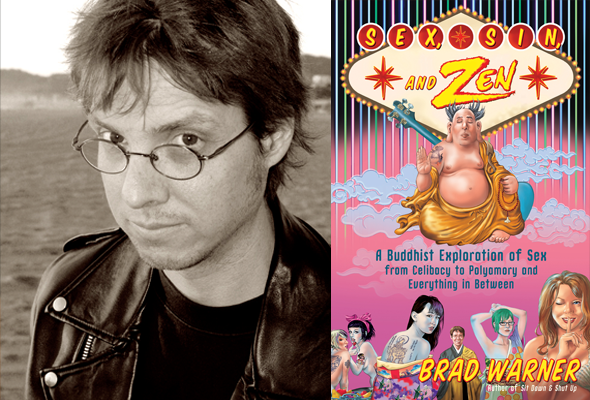“Sex, Sin and Zen,” by Brad Warner (book review – in English)

Zen teacher and writer Brad Warner tells a story about the origins of this book. When Warner was visiting Montreal to deliver a talk on Zen, a rather eccentric member of the audience asked him: “Are Buddhists allowed to jack off?” He swiftly gave the short answer: “They’re encouraged to.”
The book “Sex, Sin and Zen” could be seen as the long answer to the same question. Or rather, to all the questions about Buddhism and its attitudes toward sex – if indeed such specific Buddhist attitudes exist.
Brad Warner has acquired a certain reputation as the “punk Buddhist” – a rock bass player turned Zen Buddhist and teacher – who sometimes writes about Zen-related topics on the punk/goth themed softcore porn site Suicide Girls (you know, naked girls with tattoos and piercings). If this makes him sound like some superficial self-styled “bad boy” of Zen, think again. Reading this book I was reassured that not only does Warner know his way around Buddhism – he also writes about it as plainly and intelligibly as any author I’ve read.
Not only that, but the book is a fun read – although it definitely helps if you enjoy silly double entendres and hard rock references. So if you don’t get why a mention of the Buddhist state of Nirvana obviously leads to praise for the rock band Them Crooked Vultures you may need to pick up a copy of Rolling Stone magazine.
Warner spends a lot of time delightfully debunking popular misconceptions about Buddhism, giving his personal (and very thoughtful) takes on concepts such as “suffering” and “non-attachment”. And while he’s at it, he pokes fun at other pet peeves such as touchy-feely new age-ism, mindfulness and guided meditation. And while I may not agree with all his conclusions, at least his arguments are provocative enough to make you reconsider your own positions once more.
As for the sex part, first of all he clarifies that there is no concept of “sin” in Buddhism, focusing instead on the precept against “misuse of sexuality” – while making it very clear that there is no common consensus on what this means. Warner instead refers to historical evidence – what little there actually is – and carefully considers possible interpretations: Is celibacy helpful? Is sex a distraction – or do strict rules against sex do more harm than good? In other words, what kind of sexual practices are compatible with a Buddhist lifestyle?
Sadly, this is where the book goes slightly astray. Warner doesn’t deny that he enjoys sex – a lot – to the extent that I suspect he wrote this book to come to terms with his own sex drive. But he also reveals a surprisingly prudish streak, leading him to issue strange and rather unfounded warnings against certain sexual practices – like polyamory and BDSM.
Luckily, though, porn star, sex therapist and Zen Buddhist Nina Hartley comes to the rescue – as Warner quotes extensively from an interview he did with her. And not only does Ms. Hartley offer some sharp insights of her own – Mr. Warner also happily allows her to relate her own positive experiences of a polyamorous BDSM relationship.
While the book is largely undogmatic (some practising Buddhists may find it positively anti-dogmatic), Warner’s American Zen background shines through occasionally. To a Scandinavian, not-particularly-Buddhist, sometimes-meditator such as this reviewer, the stories of sanghas and zazen are merely interesting – though slightly alien. But Warner’s attitude towards authority is a bit baffling. One minute he praises the anti-authoritarian stance of Zen – while the next he’s asking his Roshi for advice – and accepting it at face value. Warner (who’s clearly more of a Zen master than a logic major) even defends a rather anti-gay statement from said roshi with the weakest defence I ever read: “But he only said this because I asked him.”
(Mind you, I’m not poking fun at Warner’s roshi – he likes the Suicide Girls website, so he can’t be all bad)
So no, I don’t agree with everything said in this book – but frankly, I don’t think Brad Warner would want his readers to simply agree. The point is rather to throw some ideas around, voice his own arguments and leave it to you to make up your own mind.
Most of the time the book made me both laugh (well, snicker or groan, mostly) as well as think. There were times when I’d wish Warner had hired Nina Hartley to write it instead – she comes across as that eloquent. But most of all it made me wish that I could have the author over for a chat. And surely, that should be a recommendation in itself?
Leave a Reply